La tierra se agota, that is to say «our planet is running dry», Joan Roca explains. And he creates a menu based on this, because «we can create – in fact we have created – a tasting menu of the highest quality, with extraordinary ingredients, but at the same time, right when you’re eating it, it poses ethical issues, it raises questions, perhaps it even suggests solutions. Even we, as chefs, need an ethical and responsible code to be written in accordance with science, and then to become part of everyone’s knowledge and conscience».
IThe gist is this: those who, like the three brothers from
El Celler de Can Roca, are – like
Massimo Bottura, for example - in the
hall of fame of world cuisine, out of the competition, just like
Massimo Bottura "cannot" afford to make just good, excellent or even exceptional dishes. Instead, they become a point of reference for everyone, they have a role of leadership in the forming of shared ideas; hence the opportunity/necessity/duty to elaborate a structured, deep thought of civil commitment, that starts in the kitchen and goes beyond.
This is exactly what
Joan Roca’s speech at
Madrid Fusión was: an
edible appeal, in fact it was the replay of the edible appeal pronounced through dishes last December 2nd by the same chef at the
Summit on Climate (
COP25) held in Madrid. «We thought of dishes that would expand upon thoughts we were already developing and on which we were indeed working», such as the issues related to water resources, to fair retribution in the rural world, to global warming. The result was a brief, synthetic menu; food good for the palate, shocking for the mind, that aims for the heart, «cooking as an instrument of transformation and a declaration of responsibility» to create «an ecologically sustainable food chain, socially fair and economically inclusive». Here’s the menu.
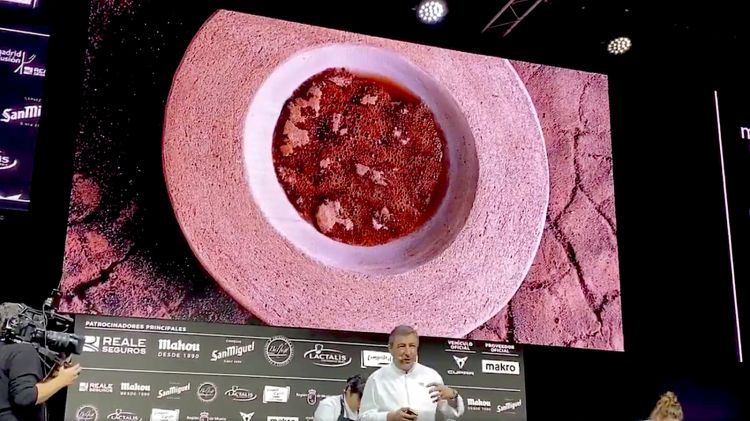
Joan Roca presents the Agua clara & agua sucia dish on the screen
(
Clear water and & dirty water)
A lyophilised soup – like a lake that has dried up – with black trumpets, truffle, porcini and roasted chickpeas, to which he adds a transparent vegetal extract, to be poured at 100°C on the plate, so that the powder turns into a broth that looks like mud. «A dirty broth, though delicious. The water turns into mud», recalling the dramatic issue of water resources.
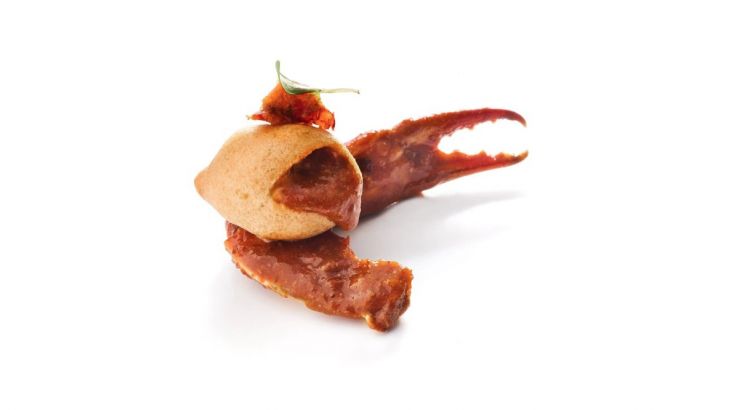
Variedades invasivas en una migración botánica incontrolada
Variedades invasivas en una migración botánica incontrolada (Invasive varieties in an uncontrolled botanic migration)
The meaning is: «If you cannot beat it, eat it». Even the marine reserves, Roca explains, are invaded by new allochthonous species, which undermine and change the ecologic balance. So we should learn to eat them. The chef mentions for example the prickly pears in the natural reserve of Cap de Creus and king crabs in the reserve on the delta of the river Ebro.
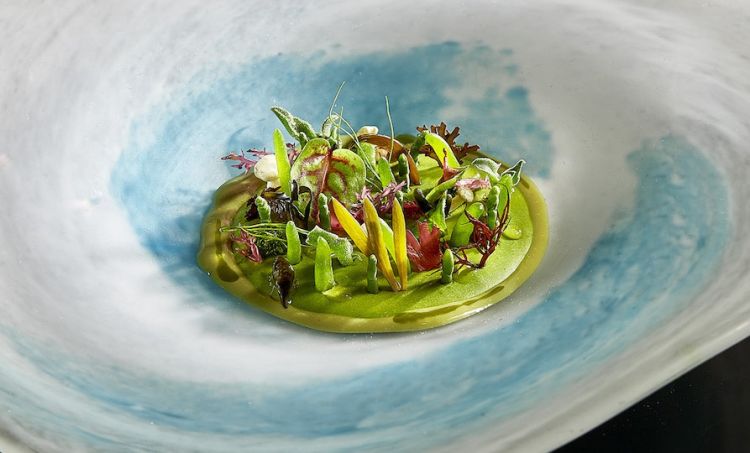
Mares calientes, comer desequilibrio
Mares calientes, comer desequilibrio (Boiling seas, eating the unbalance)
Temperature increases have acidified the oceans. Scientific research and experiments must offer new food and more sustainable ways to feed ourselves». Roca dishes out a "surf and turf" of vegetables, without meat and fish. Below, there’s a mousse of plankton, «revendicating the sea’s role as a large pantry». And then sea asparagus, seaweeds, fennel, sea fennel, enoki, pumpkin, seeds, basil, alyssum and flowers.
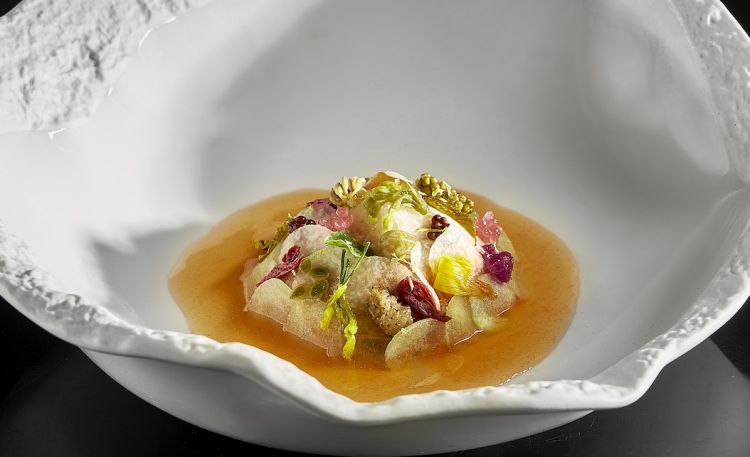
Fermentación vegetal (Vegetal fermentation)
That is to say «opening an escape route against famine and food waste», even recuperating ancient methods of preservation. The dish enhances legumes: it’s a romesco sauce of walnuts to which he adds various types of lentils, chickpeas, broad beans and beans. It’s matched with spicy notes (pickled endive, blackberry and oxalis flowers, malva sprouts, wild garlic, caper leaves, tempeh, garum, kimchi, miso, krauts) that make it tasty and fresh like a vegetable ceviche, completed with slices of beetroot and cucumber, as well as flowers, gems and stems. We must «recover the use of vegetables made by our ancestors and by those whom we’ve met while travelling around the world». There are infinite possibilities, Roca says: malva flowers, poppy sprouts, nasturtium flowers... «With water, vinegar, sugar and two grams of salt we can preserve them to use them throughout the year, or in any case extend their use in the kitchen, enhancing them both in terms of flavour and colour».
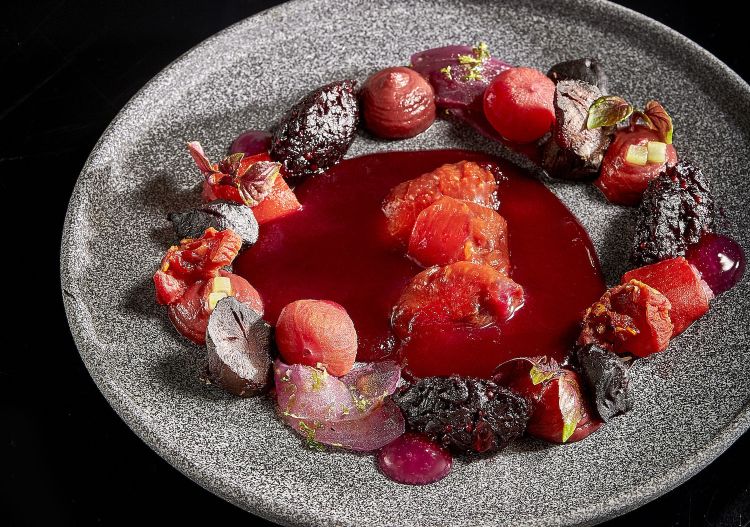
Urgente. Minimizar la proteína animal y aumentar la proteína vegetal
Urgente. Minimizar la proteína animal y aumentar la proteína vegetal (Urgent. Minimizing the use of animal proteins and increasing that of vegetal proteins)
For the next course, Roca presented a dish made with roasted beetroot matured in the refrigerating rooms used for meat (as a result, it’s like eating meat), grilled watermelon («With the aroma of grilled meat and smoke it’s like chewing meat») and finally tomatoes, red onions, candied pepper and bottarga made with red carrots, to preserve the same colours of a steak, without the steak. The ingredients come from the vegetable gardens in Murcia and Almeria devastated by the floods, last September. «We must reduce the gas emissions that cause the greenhouse effect and avoid deforestation (it is estimated that the intensive breeding of cattle is responsible for 80% of the deforestation of the Amazon forest)».
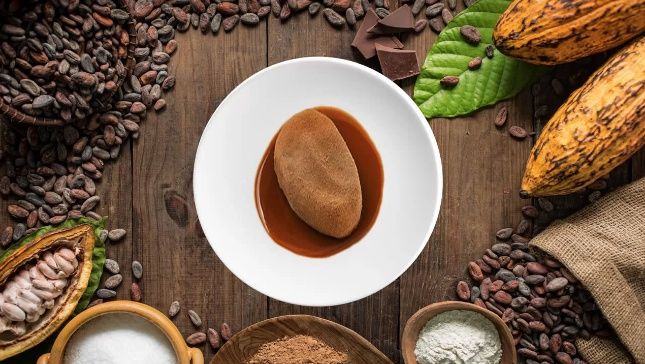
Postre, café y petit fours (Cake, coffee and petit fours)
The theme was that of social sustainability and fair prices: hence Cocoa beans, that is to say a cream of cocoa beans with a mousse of chocolate and infusion of cocoa peel. The cocoa comes from the native community of Arhuaco who lives in the Colombian Sierra Nevada. «Biodiversity and monoculture, sustainability and equal prices. To mitigate climate change and be fairer socially we must stop the attacks to small farmers and to indigenous communities, defend their land and preserve their rights. Because they are not relicts from the past, but a promise for the future». It was in this respect that Joan Roca revealed that in a few weeks’ time los tres hermanos will open a cocoa factory in Gerona, which will also be a hotel, committed to fair trade, where they will be able to exploit «all the possibilities offered by cocoa and preserve the commitment and collaboration with the communities that send us the cocoa». The coffee comes instead from African communities. As for the petit fours, finally, the Tomato bonbon from Kaduna, in Nigeria: «Over there, farmers don’t know how to preserve their tomatoes, which therefore are often thrown away in a place where many suffer from hunger. At the same time, they import packaged tomatoes from China, United States and Lebanon. We have worked with the United Nations through a specific project, to teach farmers how to preserve tomatoes and how to make sauces».
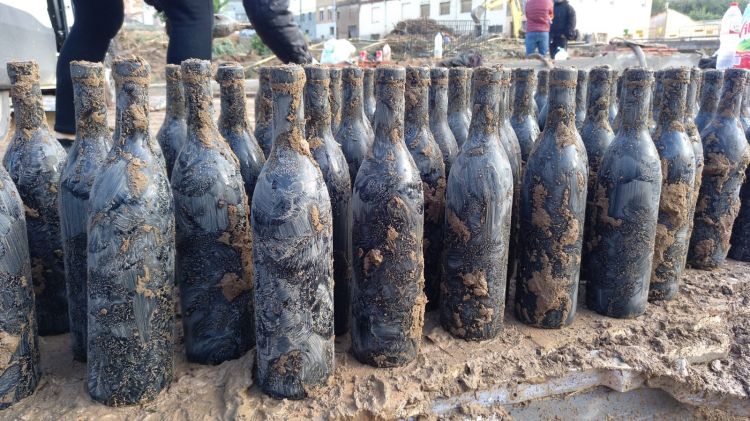
The bottles of Trepat del Jordiet 2018 saved from the mud
And since there’s nothing banal in this sustainable menu from Joan Roca, even the wines bear a message. The bottles of the Conca de Barberà Trepat del Jordiet 2018 from Celler Rendé Masdeuwere literally recovered from the mud that covered them after the flooding of the Francolì river, in Tarragona. The EmpordàCaranyana 2012 Vi de Fum from Arché Pagèswere instead produced from a vineyard that stopped a large fire in 2012, «and left a slightly smoky aroma in the palate that is hard to forget». Something similar happened to Chilean wine Huaso de Sauzal Chilena Renán Cancino 2015, produced in the arid region of Araucanía which large corporations have bought for a petty sum during the dictatorship years from the farmers living there. In recent years a huge fire destroyed thousands of hectares of vegetation in the area; the large corporations were refunded by the insurance companies, but nothing was given to the vine growers.
Translated into English by Slawka G. Scarso